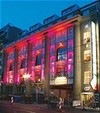Maxim Gorki Theatre

![]() Maxim Gorki Theater
Maxim Gorki Theater
Am Festungsgraben 2, 10117 Berlin-Mitte
![]() THE MAXIM GORKI THEATER BERLIN, situated near 'Unter den Linden', just behind the Neuen Wache. Karl Friedrich Zelters suggested the construction of a concert hall for the Berlin Choral Society. It was then constructed in 1825-1827 by Karl Theodor Ottmer after plans by Karl Friedrich Schinkel. Only after the 2nd World War, under the cultural-political signs of the postwar period, was the spoken theare reopened. In 1952, programmatically named Maxim Gorki, it was to represent contemporary theatre. In the course of history, the Maxim Gorki Theatre has always done just that, in the most diverse ways.
THE MAXIM GORKI THEATER BERLIN, situated near 'Unter den Linden', just behind the Neuen Wache. Karl Friedrich Zelters suggested the construction of a concert hall for the Berlin Choral Society. It was then constructed in 1825-1827 by Karl Theodor Ottmer after plans by Karl Friedrich Schinkel. Only after the 2nd World War, under the cultural-political signs of the postwar period, was the spoken theare reopened. In 1952, programmatically named Maxim Gorki, it was to represent contemporary theatre. In the course of history, the Maxim Gorki Theatre has always done just that, in the most diverse ways.
The repertoire of the first years under director Maxim Valentin (1952-1968) were characterised by special texts of Russian and Soviet realism. The programme also attempted to accompany the present of the later developmental years. Albert Hetterle (1968-1995), the second director of the house, who lead beyond political turning times of 1989, made the Maxim Gorki Theatre to a stage, which stood increasingly for the critical engagement with the present and its political amplitudes. Outstanding producers found here their artistic home, like among others Thomas Langhoff, whose legendary production of Tschechow's 'Three Sisters' and Volker Braun's 'The Society in Transition', are seen as the most important cultural-political events and became friction points in the late 1980ties. With the artistic direction by Bernd Wilms (1995-2001), the Gorki Theatre asserted itself as a small, but vibrant house, which positioned itself clearly with productions like The Captain from Köpenick' or 'Berlin Alexanderplatz'. Volker Hesse was able during his directorship (2001-2006) to initiate aesthetic and political controversies with volatile play developments, which themes relating immediately to the present and Berlin with 'Bankenstück' by Lutz Hübner and 'Der Kick' by Andres Veiel / Gesine Schmidt.
The producer and theatre author Armin Petras has been director of the Maxim Gorki Theatre Berlin since the season 2006/2007. The commitment to the tradition of the ensemble and author-theatre, the continuity in the development and teamwork with actors and the directors who produce at the Maxim Gorki Theatre Berlin, characterise the new era of the smallest playhouse in the centre of Berlin. Contemporary productions of classic drama and the classical modernism of the 19th and 20th-century, as well as material from Berlin and Brandenburg define the repertoire of the big stage. The studio stage of the Maxim Gorki Theatre Berlin is a place of artistic and political discussions and regular teamwork with living authors and international guests. Numerous premieres and first performances. readings, performances and discussions turn it into a workshop for new formats and play levels of meeting art, politics and science.
![]() Transport Links:
Transport Links:
S-Bahn: Friedrichstrasse/Hackescher Markt
U-Bahn: Friedrichstrasse
Bus: 100, 200, TXL (Stop 'Staatsoper')
Tram: M 1,12 (Stop 'Am Kupfergraben')
Underground parking Q-Park 'Unter den Linden', Bebelplatz,10117 Berlin
![]() Tickets and information:
Tickets and information:
ticket@gorki.de, Tel. 030.20221-115

 Deutsch
Deutsch Nederlands
Nederlands Dansk
Dansk Österreichisch
Österreichisch Po Polsku
Po Polsku
















